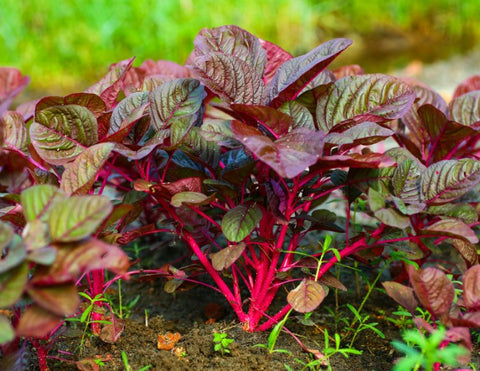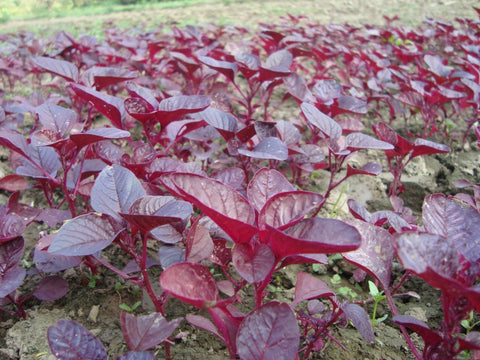20 Red Spinach Supplement Facts and Benefits
A daily red spinach supplement has proven benefits for the body, like improved sports performance levels, and optimized health. Research continues to explore the advantageous qualities of this crimson plant, commonly used to improve athletic abilities. Red spinach extract is rich in phytochemicals and nitrate, which converts into nitric oxide in the body. Nitric oxide is an essential molecule that can support healthy circulation. Here is a breakdown of 20 key benefits to know about nature's red leaf wonder.
The Top Benefits and Facts About Red Spinach

1. Red Spinach Extract Improves Endurance
Studies show that red spinach had an impact on exhaustion rates in older adults. A study from Massey University in Auckland, New Zealand, revealed that red spinach increased nitric oxide levels and significantly improved time to exhaustion. Red spinach is a beneficial whole food that supports improved endurance levels in athletes and aging people. Endurance and nitric oxide levels decrease with age which makes nitrate rich vegetables a great dietary addition.
2. Athletic and Exercise Performance Boosted by Red Spinach
Many high-performing athletes eat nitric oxide foods as recommended by their trainers, dietitians, and healthcare professionals. A study from the Journal of Strength and Conditioning revealed that red spinach improved cycling time in recreationally active men and women. Participants experienced reduced completion time and increased power and speed while lowering exertion levels. These results have catapulted red spinach to the top of the sports food list for its assistance in improved athletic and exercise performance.
3. Nitric Oxide and Muscle Growth
Research shows red spinach increased strength up to three times higher than the placebo group. The ergogenic benefits of a red spinach supplement stem from its nutrient density and high nitrate levels. As a result of better performance levels, red spinach can also improve muscle growth. Individuals are able to exercise harder for a longer duration, leading to stronger muscles. A 2021 study assessed the benefits of red spinach extract for individuals performing resistance training. The suggested amount of nitrate needed to experience these benefits is upwards of 400mg. It is challenging to ingest these levels solely from nitric oxide foods. Red spinach is concentrated into powder to make high levels of dietary nitrate available in a convenient form for athletes interested in muscle growth.
4. Antioxidants and Red Spinach Powered Muscle Recovery
Red spinach is high on the list of nitrate rich foods that support faster muscle recovery. During exercise, the high nitrate levels convert to nitric oxide in the body. This allows oxygen and necessary nutrients to reach vital muscles and organs. This process also supports the body post-exercise, allowing individuals to recover quicker and more efficiently.
5. Red Spinach and Cardiovascular Health
A red spinach supplement contains phytosterols which play a role in cardiovascular health. Numerous studies have shown that daily consumption of phytosterols from whole foods can support healthy cholesterol levels. Red spinach's high nitrate value also encourages healthy circulation and general heart health.
6. Nitric Oxide Supports Arterial Health
Nitric oxide foods are commonly leafy green, root, and cruciferous vegetables, most notably red spinach and beets. A Toronto University study revealed that red spinach might support vascular health and circulation. Red spinach is a good dietary addition to boost nitrate levels that may offer benefits for arterial health.
7. Better Digestion
Red spinach, when eaten as a whole food, is a fibrous vegetable that may help with digestion. Red spinach as a supplement has been used for centuries across many cultures and was frequently used as a natural way to support digestive health.
8. Colon Health and Red Spinach Fiber
Similar to its numerous digestive benefits, red spinach is rich in soluble fiber and may help keep the colon clean. The colon, which includes the large intestine, breaks down food into waste. Red spinach may naturally support the colon and encourage optimal health of the large intestine.
9. Skin Health with Red Spinach Antioxidants
Red spinach has high levels of vitamin C and E that may be beneficial for supporting healthy skin. It is a natural source of vitamins, minerals, phytochemicals, and essential antioxidants that promote overall wellness. The high antioxidant levels might be a helpful addition to maintaining hydrated, glowing skin.
10. Natural Antioxidant Source with Red Spinach Polyphenols
A study published in Nutritional Food Science revealed that red spinach extract is a potential source of natural antioxidants, and frequent consumption improves the antioxidant status. Red spinach is rich in polyphenols, complex amino acids, and betacyanins that have powerful benefits on the body. Betacyanins are antioxidants that may have even greater antioxidant effects than vitamin C.
11. 5x Higher Nitrate Concentration Than Beets
Beetroot juice is popular in the athletic community as a nitric oxide food, known for its endurance benefits. It is estimated that red spinach has up to five times higher nitrate concentration than beets. The amazing benefits of beetroot juice can be found in red spinach, but with potentially greater advantages.
12. Red Spinach is an Energy Booster
This red leafy vegetable is nutrient-dense and full of beneficial carbohydrates to sustain energy. A red spinach supplement supports nitric oxide production that can greatly boost endurance and exercise performance. This can increase energy levels and help the body exercise longer with less fatigue. In older people, nitric oxide boosters are often used to encourage better energy throughout daily life.
13. Red Spinach Contains Iron
Red spinach as a whole food contains iron that may support healthy blood flow throughout the body. Overall, red spinach is nutrient-dense and a potent source of essential vitamins and minerals.
14. Red Spinach Thrives in Tumultuous Climates
Red spinach is a resilient plant that is drought tolerant, thrives in high altitudes, and can withstand strong winds. The plant is incredibly tough, and it comes as no surprise that the nutrient-dense stalk and leaves boost so many health benefits for the body. It’s a powerhouse plant both in nature and for humans.
15. May Increase Ventilatory Threshold
A study from Auburn University suggests that red spinach may help the body use oxygen more efficiently. An increased VO2 Max threshold allows energy levels to stabilize during physical activity by encouraging oxygen transport to essential organs, tissues, and muscles. Red spinach may be beneficial to support the body during oxygen demanding activity.
16. Red Spinach Contains Phytoecdysteroids
Red spinach contains ecdysterone, which is a naturally occurring steroid hormone. When derived from plant matter, it is referred to as a phytoecdysteroid. A 2008 analysis suggested that these compounds may serve as effective anabolic, immunoprotective, antioxidant, and hypoglycemic agents. When tested on physical enhancement, research shows that ecdysterone can influence increased performance, strength, and muscular repair.
17. Immunity Boosting with Red Spinach
Red spinach is a nutrient-dense vegetable containing vitamin E, vitamin K, vitamin C, and many other potent antioxidants. Red spinach is a natural way to boost immunity levels and support a well-rounded diet rich in vitamins, minerals, and polyphenols.
18. Low-Caloric Density Food
Red spinach is a good addition to a healthy routine and promotes many benefits considering its low caloric density. Whether eaten raw, steamed, or in a powdered supplement or extract, raw spinach is low in calories and high in nitrate as well as vital nutrients.
19. Known as the Amaranth Plant
A fun fact about red spinach is the origin of its name. Amaranth is the Greek word for “unfading” and was chosen as the name for this family of plants. This title seems to parallel the numerous benefits of red spinach perfectly. Red spinach supports strength, resilience, and vitality in the body.
20. Natural nitric oxide booster
It is well noted that red spinach increases nitric oxide. However, it is important to note what makes a red spinach supplement so widely accredited. Red spinach is a popular nitric oxide food, containing one of the highest natural levels of nitrates. It has low sugar levels and converts well into a dietary powder or extract. Red spinach is one of the most convenient ways to consume the high levels of nitrates necessary to enhance endurance.

Overall, red spinach is packed full of benefits for the body. Red spinach is a natural nitric oxide booster and antioxidant-rich superfood. It is recommended to source nitrates, vitamins, and minerals from whole foods or clean supplements—making red spinach a great option for daily consumption.
Resources:
Stanaway L, Rutherfurd-Markwick K, Page R, Ali A. Performance and Health Benefits of Dietary Nitrate Supplementation in Older Adults: A Systematic Review. Nutrients. 2017;9(11):1171. Published 2017 Oct 27. doi:10.3390/nu9111171
Gonzalez, Adam M.1; Accetta, Matthew R.1; Spitz, Robert W.1; Mangine, Gerald T.2; Ghigiarelli, Jamie J.1; Sell, Katie M.1 Red Spinach Extract Supplementation Improves Cycling Time Trial Performance in Recreationally Active Men and Women, Journal of Strength and Conditioning Research: September 2021 - Volume 35 - Issue 9 - p 2541-2545 doi: 10.1519/JSC.0000000000003173
Haynes JT 4th, Townsend JR, Aziz MA, et al. Impact of Red Spinach Extract Supplementation on Bench Press Performance, Muscle Oxygenation, and Cognitive Function in Resistance-Trained Males. Sports (Basel). 2021;9(6):77. Published 2021 May 27. doi:10.3390/sports9060077
Grundy, M. M. L., Edwards, C. H., Mackie, A. R., Gidley, M. J., Butterworth, P. J., & Ellis, P. R. (2016). Re-evaluation of the mechanisms of dietary fiber and implications for macronutrient bioaccessibility, digestion and postprandial metabolism. British Journal of Nutrition, 116(5), 816-833.
Jovanovski E, Bosco L, Khan K, et al. Effect of Spinach, a High Dietary Nitrate Source, on Arterial Stiffness and Related Hemodynamic Measures: A Randomized, Controlled Trial in Healthy Adults. Clin Nutr Res. 2015;4(3):160-167. doi:10.7762/cnr.2015.4.3.160
Ko SH, Park JH, Kim SY, Lee SW, Chun SS, Park E. Antioxidant Effects of Spinach (Spinacia oleracea L.) Supplementation in Hyperlipidemic Rats. Prev Nutr Food Sci. 2014;19(1):19-26. doi:10.3746/pnf.2014.19.1.019
Moore AN, Haun CT, Kephart WC, et al. Red Spinach Extract Increases Ventilatory Threshold during Graded Exercise Testing. Sports (Basel). 2017;5(4):80. Published 2017 Oct 16. doi:10.3390/sports5040080
Báthori M, Tóth N, Hunyadi A, Márki A, Zádor E. Phytoecdysteroids and anabolic-androgenic steroids--structure and effects on humans. Curr Med Chem. 2008;15(1):75-91. doi: 10.2174/092986708783330674. PMID: 18220764.





Comments (0)
There are no comments for this article. Be the first one to leave a message!